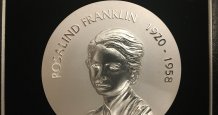News archive 2021

Exeter researcher co-authors new book on photonic structures
Dr Sébastien R. Mouchet, from the University of Exeter, has co-authored a new book about biological photonic devices.

Mystery behind formation of surface ice-shapes on Pluto unravelled
Scientists have unravelled a fascinating new insight into how the landscape of the dwarf-planet Pluto has formed.

Revolutionising 3D imaging with an endoscope the width of a human hair
Scientists have developed a new form of endoscope, just a hair’s width in diameter, that could transform 3D imaging for a wide range of applications from industrial inspection to environmental monitoring, and eventually make medical imaging less uncomfortable for patients.

Quest to deliver ultra-fast and energy efficient magnetic recording moves step closer
The quest to deliver ultra-fast and energy efficient magnetic recording could be a step closer to fruition, due to pioneering new research on all-optical switching of magnetization.

Physicists exploit space and time symmetries to control quantum materials
Physicists from Exeter and Trondheim have developed a theory describing how space reflection and time reversal symmetries can be exploited, allowing for greater control of transport and correlations within quantum materials

Exeter expert awarded prestigious Institute of Physics medal
Professor Frank Vollmer, from the University of Exeter, has been awarded the prestigious Rosalind Franklin Medal by the Institute of Physics.

Rising research star secures prestigious IoP award
One of the University of Exeter’s rising research stars has received a prestigious award from the Institute of Physics.

Physicists reveal non-reciprocal flow around the quantum world
Physicists from Exeter and Zaragoza have created a theory describing how non-reciprocity can be induced at the quantum level, paving the way for non-reciprocal transport in the next generation of nanotechnology

£2.5 million investment in 35 new PhD studentships
The University of Exeter is investing £2. 5 million in preparing the next generation of researchers to tackle some of the biggest global issues of the 21st century.

Imaging at the tip of a needle
Scientists have developed a new technique that could revolutionise medical imaging procedures using light.

A biological blueprint for tough colour.
The unique mechanical and optical properties found in the exoskeleton of a humble Asian beetle has the potential to offer a fascinating new insight into how to develop new, effective bio-inspired technologies.

Mystery behind the “Great Dimming” of the Betelgeuse star solved
The quest to discover what lay behind the “great dimming” of the aging star Betelgeuse, normally one of the brightest stars on the night sky, has taken a new, fascinating twist.

Star’s death will play a mean pinball with rhythmic planets
Four planets locked in a perfect rhythm around a nearby star are destined to be pinballed around their solar system when their sun eventually dies, according to a new study that peers into its future.

Research project receives €6M to boost greener consumer products in Europe using innovative biotechnology
A pioneering, pan-European research project, designed to boost greener industrial processes for more sustainable daily consumer products like cosmetics or foods, has been launched.

Robots with T-ray technology to spot and remove cancer tumours in £8 million project
New technology that will marry probes that can detect cancer tumours through the skin with high-precision robotic surgery is to be developed for use in hospital settings for the first time.

University of Exeter student awarded grant to study exoplanet climates
University of Exeter astrophysics student Mei Ting Mak has been awarded one of this year’s prestigious grants from the Bell Burnell Graduate Scholarship Fund.

Global network brings together researchers to uncover laws of thermodynamics at the nanoscale
Theoretical Physicists at the University of Exeter initiated and have led a major scientific network, bringing together researchers in Europe and the world, to uncover the laws of thermodynamics at the nanoscale.

The science of spin - older stars rotate faster than expected
Stars spin faster than expected as they age, according to a new study - which uses asteroseismology to shed new light on this emerging theory

University of Exeter joins Europe’s largest astronomy network
The University of Exeter is joining Europe’s largest, ground-based astronomy collaborative network, it has been announced.

University of Exeter partnership develops novel algorithms with the power to transform the use of quantum computers
Dr Oleksandr Kyriienko, lead of the University of Exeter’s Quantum Dynamics, Optics, and Simulation group (QuDOS) is working in close partnership with Dutch start-up Qu & Co to develop quantum software with the potential to transform the way we use the huge power of quantum computers in industry.

Dr Alex Corbett awarded Industry Fellowship
Dr Alex Corbett has received a Royal Society Short Industry Fellowship to work with M Squared Life Limited.

Pioneering new technique could revolutionise super-resolution imaging systems
Scientists have developed a pioneering new technique that could revolutionise the accuracy, precision and clarity of super-resolution imaging systems.
